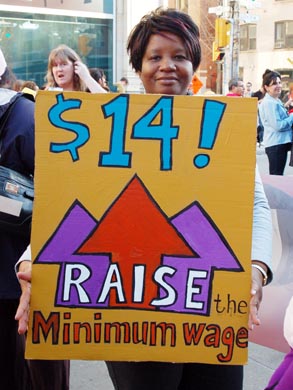Ontario is on the verge of indexing minimum-wage workers into perpetual poverty.
This is a political choice being made by politicians in the province. The Liberal party is calling for an $11-an-hour minimum wage indexed to inflation. The ONDP is calling for a $12-an-hour minimum wage two years from now also indexed to inflation. The Tories would simply leave workers exactly where they are.
Poor.
Both of the Liberal and ONDP proposals start well below the poverty line and this directly means that minimum wage workers will be, by any reasonable standard, indexed to stay below the poverty line forever. If it is pegged to a below poverty rate to begin with and then tied to “inflation” it makes it so that the minimum-wage workers can never, by definition, climb out of poverty.
This is why many business groups support this idea. Why wouldn’t they? It allows them to pay poverty wages in perpetuity by law!
Meanwhile, social assistance rates remain at levels that are incomprehensibly sadistic and wrong.
Given this willingness to index poverty into law and to ignore the vicious reality of where social assistance is at, it seems worth noting that the inequality that exists between those in office making these decisions and those they are condemning it to is truly profound and obvious.
Even assuming that one can get full-time work, a worker working a full-time job at the new minimum-wage proposal of the Liberals would make a pre-tax income of $22,880 a year. A worker under the ONDP proposal would make $24,960 a year in 2016, even, again, assuming they got full-time work
These are astonishingly low wages that are impossible to live on in Ontario, especially in a major city like Toronto.
A $15-an-hour minimum wage allows for a full-time income of $31,200 a year. A dramatic improvement that would have a clear and obvious impact on the lives of workers. Especially given that now the pre-tax income of a full-time minimum-wage worker is at most $22,360.
Meanwhile, a single person on welfare in Ontario receives, $7,512 a year.
Seriously. $7,512 a year.
Who is making these decisions about the minimum wage and welfare? Given that it is a minority parliament that has allowed this to continue for three years, all the parties have made this decision. And not one of them is claiming to want to do anything differently in this regard.
So the people making the decisions are Kathleen Wynne who made $198,521.29. Tim Hudak who made $180,885.60. Andrea Horwath who made $158,157.96.
Rosario Marchese who made $129,720.00. Ted McMeekin who made $165,851.04. Peter Shurman who made $116,550.00.
Every single person making the choice, and it is a choice, to continue to legislate poverty for those on social assistance and working for the minimum wage made in excess of $100,000 a year. Every single MPP.
The contrast is very stark and very clear.
The question, in the end, is how many people in Ontario have to be working for the poverty wages that are less than $15 an hour or “living” off of cruel social assistance rates before any political party or MPP making over $100,000 a year cares?
What is the perceived electoral risk versus big salary for themselves ratio that is required before any MPP in Ontario will actually do something to prevent the indexing of poverty wages into law or before they will stand up for meaningful increases in what human beings on social assistance are forced to subside on?
Image: OPSEU



